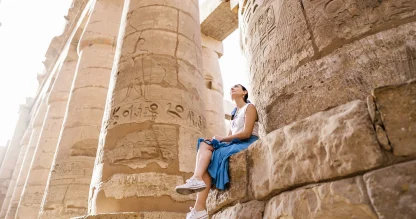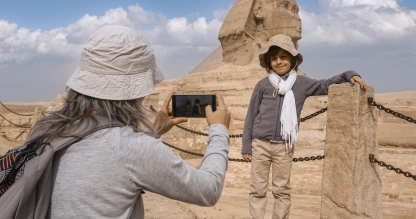Memphis: A Journey Through the Magnificent Ancient City
Memphis, Egypt, is not just an ordinary city; it's a treasure trove of ancient history, a time capsule that takes you thousands of years back to the time of the pharaohs. Once a bustling metropolis of the ancient world, Memphis is now a UNESCO World Heritage site, attracting adventurers, historians, and curious travelers from all corners of the globe.
The city's name, Memphis, is of Greek origin, but the ancient Egyptians knew it as Ineb-Hedj, meaning "the white walls". Located at the mouth of the Nile Delta, Memphis was the first capital of unified Egypt, founded by the pharaoh Menes around 3100 BC. Today, the ruins of this once-magnificent city lie near the town of Mit Rahina, 20 km south of Cairo.
Despite the passage of time, Memphis continues to hold its charm, offering a captivating glimpse into Egypt's glorious past. Its rich history, intriguing mysteries, and awe-inspiring monuments make it a must-visit destination for anyone exploring Egypt.
The Historical Significance of Memphis
Memphis holds a significant place in history as one of the oldest and most important cities in ancient Egypt. It was the heart of Egypt for over eight dynasties, serving as a key political, religious, and economic center. The city was home to the royal palaces and the temples of Ptah, the patron god of Memphis.
The strategic location of Memphis, at the crossroads of Upper and Lower Egypt, made it an ideal administrative capital. It was also a vital port, connecting the Nile valley to the Mediterranean Sea, facilitating trade and cultural exchange with other civilizations.
Despite its decline, Memphis has left an indelible mark on history. Its legacy lives on in the form of its monumental ruins, inscriptions, and artifacts, serving as a testament to the grandeur of ancient Egyptian civilization.

The Rise and Fall of Ancient Memphis
The story of ancient Memphis is a tale of rise and fall, of glory days and eventual decline. Founded at the dawn of the dynastic era, Memphis quickly rose to prominence, becoming the religious and political hub of ancient Egypt.
However, as the centuries rolled on, the city began to lose its status. The rise of Thebes and later Alexandria as important cultural and political centers led to the gradual decline of Memphis. Despite this, it continued to be revered for its religious significance.
By the time of the Roman conquest, Memphis had lost much of its former glory. The city was eventually abandoned, its stones used to build nearby settlements. Today, what remains of Memphis offers a fascinating glimpse into this city's glorious past and its role in shaping Egypt's history.

Tourist Attractions in Memphis
Despite its ruinous state, Memphis still hosts a plethora of tourist attractions, each narrating a different tale of the city's past. The colossal statue of Ramses II, made from a single piece of limestone, is a prime example of ancient Egyptian artistry. The Alabaster Sphinx, another iconic monument, is said to symbolize the power and wisdom of the pharaohs.
The Open-Air Museum in Memphis houses an impressive collection of relics, statues, and architectural pieces from various periods of Egyptian history. From the remains of the Temple of Ptah to the intricate carvings on the fallen colossus of Ramses II, the museum provides a comprehensive overview of Memphis' historic landscape.
Exploring the ancient necropolis of Saqqara, home to the step pyramid of Djoser and numerous tombs, is like walking through an open history book. Besides these, the serene surroundings and the palm-fringed landscapes add to the charm of touring Memphis.

Unveiling the Mysteries of Memphis
There are still many mysteries surrounding Memphis, waiting to be unveiled. The city's ruins and artifacts continue to provide new insights into its history, culture, and beliefs. The discovery of the tombs of Apis bulls in the Serapeum of Saqqara, for instance, shed light on the religious practices of the ancient Egyptians.
The decipherment of hieroglyphic inscriptions on the walls of Memphis' temples and tombs has also revealed intriguing details about the life and times of its inhabitants. From royal decrees and religious hymns to personal letters and administrative documents, these inscriptions offer a rich record of Memphis' past.
Despite the wealth of knowledge gained, there's still much to learn about Memphis. Every excavation, every artifact unearthed, brings us one step closer to unraveling the enigma that is ancient Memphis.

Must-see Landmarks in Memphis
When in Memphis, there are several landmarks that one simply cannot miss. The Step Pyramid of Djoser, the first pyramid ever built, is a feat of ancient engineering that continues to astound visitors. The massive fallen statue of Ramses II, once the centerpiece of the Ptah Temple, is another must-see.
The Great Sphinx of Egypt, although located in Giza, is closely associated with Memphis due to its historical significance. This iconic monument, with the body of a lion and the head of a man, stands as a symbol of the enduring legacy of ancient Egypt.
The ancient necropolis of Saqqara, with its myriad tombs and monuments, is another must-visit site. This vast burial ground offers a unique insight into the burial practices and beliefs of the ancient Egyptians.

Cultural Heritage: Museums and Artifacts of Memphis
The museums of Memphis are treasure houses of ancient artifacts, each telling a tale of the city's glorious past. The Open-Air Museum, for one, hosts an impressive collection of statues, sphinxes, and architectural fragments unearthed from the city's ruins.
The Imhotep Museum, located in Saqqara, is dedicated to Imhotep, the architect of the Step Pyramid. The museum showcases artifacts from the pyramid complex, including stone vessels, statues, and mummy masks.
The Egyptian Museum in Cairo, although not located in Memphis, houses many significant artifacts from the city. Among its vast collection are the treasures of Tutankhamun, the Narmer Palette, and the Rosetta Stone, all seminal to understanding Egypt’s ancient history.

Happy Travellers with Cairo Nile Cruise!
Take a look at our top Egypt Tours reviews, where you will find firsthand insights from our very own Intrepid travellers.



